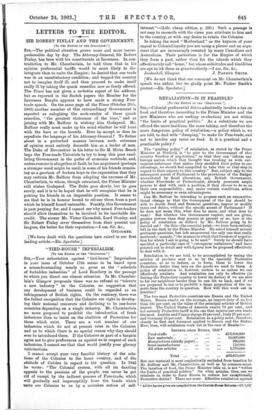" TIED-HOUSE " IMPERIALISM.
rro THE EDITOR OP THE "SPECTATOR:1 Srn,—Your exhortation against " tied-house " Imperialism in your issue of October 17th seems to be based upon a misunderstanding nearly as gross as the "schedule of forbidden industries" of Lord Rosebery in the passage to which you direct our closest attention. In Mr. Chamber- lain's Glasgow proposals there was no refusal to "tolerate a new industry" in the Colonies, no suggestion that any development of business could be regarded as an infringement of British rights. On the contrary, there was the fullest recognition that the Colonies are right in develop- ing their national resources and declining to be one-horse countries depending on a single industry. Mr. Chamberlain no more proposed to prohibit the introduction of fresh industries than to insist on the abolition of Protection for those which exist. There are a vast number of our industries which do not at present exist in the Colonies and as to which there is no special reason why they should ever be introduced there. If the Colonies as part of a bargain agree not to give preferences as against us in respect of such industries, I cannot see that that would justify your gloomy vaticinations.
I cannot accept your very fanciful history of the rela- tions of the Colonies to the home country, and of the attitude of Cobden in regard to the question. In 1842 he wrote : " The . Colonial system, with all its dazzling appeals to the passions of the people, can never be got rid of except by the indirect process of Free-trade, which will gradually and imperceptibly loose the bonds which unite our Colonies to us by a mistaken notion of self- interest."—(Life, cheap edition, p. 230.) Such a passage is not easy to reconcile with the views you attribute to him and to the country, or with any desire to retain the Colonies.
In taking the word " Motherland " as the keynote" of your appeal to Colonial loyalty you are using a phrase and an argu- ment that are increasingly resented by many Canadians and Australians. Their patriotism is for the Empire of which they form a part, rather than for the islands which they affectionately call "home," but whose solicitudes and timiditiea are apt to irk them as grandmotherly.—I am, Sir, &c.,
[We do not think that our comment on Mr. Chamberlain's speech was unfair, but we gladly print Mr. Parker Smith's protest.—En. Spectator.]






















































 Previous page
Previous page